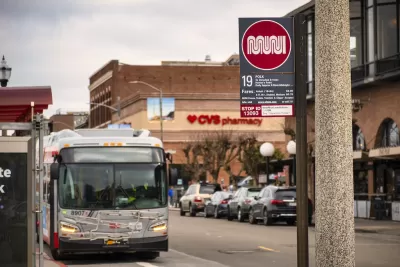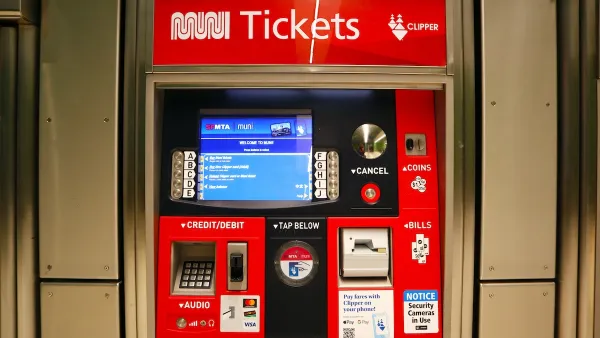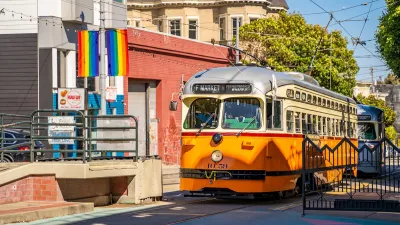The SFMTA is improving service at off-peak hours and on weekends to accommodate new travel patterns that rely less on weekday commuters. Ridership has increased accordingly.

The San Francisco Municipal Transportation Agency (SFMTA) transit system saw its highest ridership since the start of the Covid-19 pandemic this September, reports James Salazar for the San Francisco Examiner.
“The transit system averaged more weekday riders in September — 521,050, or about 74% of levels from the same month in 2019 — than any month since February 2020, crossing the threshold of 500,000 average weekday boardings for the first time since then, according to a newly published San Francisco Municipal Transportation Agency report.” Weekend boardings were at 92 percent of pre-pandemic levels, Salazar adds.
The agency acknowledges that the bulk of trips has shifted from office commuters to off-peak travelers, prompting SFMTA to make changes to routes to accommodate new travel patterns. “The agency rerouted the 22 Fillmore — the monthly ridership of which was at 122% of pre-pandemic levels — to serve additional parts of the emerging Mission Bay neighborhood. SFMTA also built transit-only lanes on 17th street, which Tumlin said helped the bus line’s speed and reliability.” According to SFMTA, subway delays have decreased by 50 percent since before the pandemic.
The system is refocusing its efforts on serving attendees to music festivals and other events in San Francisco, weekends that often see spikes transit ridership. According to SFMTA director Jeffrey Tumlin, “Chase Center event tickets doubling as Muni passes has driven ridership to the arena and its surrounding neighborhoods.”
FULL STORY: Muni crosses half-million monthly rider average for first time since 2020

Planetizen Federal Action Tracker
A weekly monitor of how Trump’s orders and actions are impacting planners and planning in America.

Congressman Proposes Bill to Rename DC Metro “Trump Train”
The Make Autorail Great Again Act would withhold federal funding to the system until the Washington Metropolitan Area Transit Authority (WMATA), rebrands as the Washington Metropolitan Authority for Greater Access (WMAGA).

The Simple Legislative Tool Transforming Vacant Downtowns
In California, Michigan and Georgia, an easy win is bringing dollars — and delight — back to city centers.

The States Losing Rural Delivery Rooms at an Alarming Pace
In some states, as few as 9% of rural hospitals still deliver babies. As a result, rising pre-term births, no adequate pre-term care and "harrowing" close calls are a growing reality.

The Small South Asian Republic Going all in on EVs
Thanks to one simple policy change less than five years ago, 65% of new cars in this Himalayan country are now electric.

DC Backpedals on Bike Lane Protection, Swaps Barriers for Paint
Citing aesthetic concerns, the city is removing the concrete barriers and flexposts that once separated Arizona Avenue cyclists from motor vehicles.
Urban Design for Planners 1: Software Tools
This six-course series explores essential urban design concepts using open source software and equips planners with the tools they need to participate fully in the urban design process.
Planning for Universal Design
Learn the tools for implementing Universal Design in planning regulations.
Smith Gee Studio
City of Charlotte
City of Camden Redevelopment Agency
City of Astoria
Transportation Research & Education Center (TREC) at Portland State University
US High Speed Rail Association
City of Camden Redevelopment Agency
Municipality of Princeton (NJ)





























